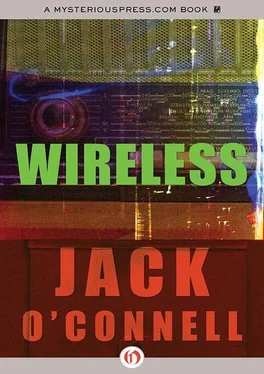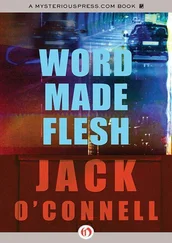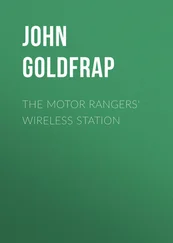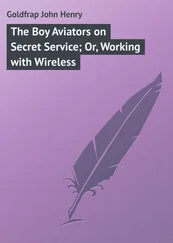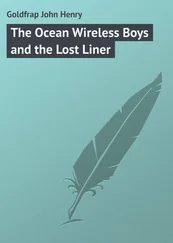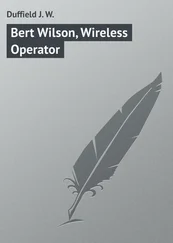“And there’s an off switch on every radio, Flynn. No one makes people listen to Ray Todd.”
“There are reasons I do what I do—”
“Right,” she says, indicating the farmhouse with a tilt of her head. “But you don’t seem to know what they are.”
He stops himself from blurting a comeback, waits a beat, then says, “Okay, maybe I’m just one more confused guy.”
“And maybe you just don’t trust me completely,” Ronnie says. “Not yet. And maybe that’s a smart move at this point. I can tell already, I’m more instinctual than you—”
“That right?”
“—and I think, maybe, you’re sitting in the middle of this awful paradox. And I think you tie yourself up in knots trying to make things logical.”
“Paradox?”
“Yeah,” Ronnie says. “I think maybe you’ve found that, through no fault of your own, by some quirk of nature, okay, the orphan boy moved pretty easily into the heart of the system. He ended up looking the part. The language came easy. He wore clothes well. He had a weird knack for sales and for saying the right words at the right time. He discovered this genius for subliminal manipulation.”
“This is me, now, right? This is beautiful—”
“But the lousy thing was — the more Flynn moved into the heart of the system, the more he hated it. So here’s the paradox. He stayed there and made good money off this system to finance the people who couldn’t fit in. And who wanted to tear it down.”
“You think I’m a man of huge responsibilities.”
“You know why you hate Ray Todd so much—”
“Who says I hate Ray Todd?”
“It’s because people with brains like Ray Todd are absolutely convinced they know what’s best. Not only for themselves but for you. And they want to enact the knowledge. They want to make it as unconditional as nature. That’s the heart of fascism, G.T. And what you can’t stand, whether you know it or not, what you can’t bear, is the fact that it’s sleeping, to some degree, inside every one of us. It’s like as a kid, you never figured that out. Or if you did, you just blocked it out completely.”
“That’s your take on human nature?” Flynn says. “Were your parents this cynical? Does this run in the genes?”
“I think maybe you come out here ’cause the nuns told you life was different. That if you cut into the human heart you’ll find a sleeping Jesus. Not a sleeping fascist. And you want to figure out why they lied to you. And you sit in the car and never go up to the door ’cause you can’t stand to finally give up their version.”
He doesn’t know what to say and this bothers him because he knows that not speaking, not returning a quick rebuttal, validates what she’s said. The car goes silent for a long awkward minute and when he does finally find his voice, it comes out different. There’s no edge and no rhythm, no shading of an angry humor. And no sarcasm whatsoever.
He says, “I wish I could take you through that house.”
More silence, and then, “There’s this old dirt-floor cellar. Classic New England cellar. Mortared rough-stone foundation. Hottest day of summer, that place used to be cool as October.”
There’s a pause. He rubs his hand at his neck, touches his Adam’s apple.
“Most of the others hated the cellar. It was dark. Musty. Shadows everywhere. But I loved it. I loved exactly those things. And way in the back, in the deepest corner of the cellar, was this little shaft area. I don’t know, it might have originally been a potato bin or something. But when I was there it was filled with scrap wood. Just random pieces of plank and beams and I remember there was some hacked-up barn board. It was just this big pile of wood. Sat about four feet high. When it rained, when it really poured, the cellar would take in water. You ever smell wet wood? You know that smell? I’ll never forget that smell.”
He puts his hands on the steering wheel, the classic driving-school grip.
“I used to be missing a lot. The nuns would have something going on and they could never find me. By suppertime I’d show up. To this day no one ever knew where I was hiding. Drove them nuts. Maybe that’s why I got hit with the Bible that time.”
She watches his hands tighten slightly on the wheel.
“Probably not,” he says.
“You were in the wood shaft,” Ronnie says, flinching at her own voice.
He nods.
“I was in the wood shaft. I was in that little bin. Every time. I was sitting on top of the pile of wood. Really down in it. Kind of blanketed with scrap wood. It’d be covering my legs.”
She gives him a few seconds to go on and when he doesn’t, she pushes. “Why were you there?”
“I just wanted to be there. I just wanted to be alone. In the dark.”
“What would you do?”
“I’d just sit. And then I’d listen to my own breath. And then I’d catch myself praying.”
“Praying?”
“Act of Contrition.” His voice breaks a little. She can hear stress in the short phrasing. Something’s happening in his throat.
“You thought you’d done something wrong?”
“I must have. To be there. To have no one.”
She brings her hand up to the side of his face, touches his cheek, and lets her fingers go into the hair above his ears. She’s acting on instinct. She doesn’t know what to say.
“That was a long time ago, Flynn,” she tries.
His hand goes from the steering wheel to the shift. He pops the car into gear, lets out a staggered breath, and whispers, “Let’s get the fuck out of here.”
Hazel is walking south on Rimbaud headed for the Rib Room. Hannah lets the Mustang hang a good two car lengths back, keeps her foot off the gas, and pulls to the curb whenever a car comes into the rearview. She takes a full block to study Hazel’s walk and decides the girl has a genuine confidence, something innate, beyond a cultivated act. Beyond the sarcastic and impatient lip she uses on all her camp followers.
As they approach the diner, Hannah finds an open meter and parks. She has to jog to reach Hazel before she enters the Rib Room, but she manages to come up. beside her and link their arms, just one more pair of lesbian artist punks out for coffee and small talk on a beautiful fall day.
Hazel freezes in place, gives away nothing in the second it takes her to get clear on who’s latched onto her arm. Then her eyes tighten and her teeth clench and Hannah can almost hear her brain grinding for the most vicious greeting on file.
Hannah beats her to the punch, leans in and kisses her on the cheek with a rough, wet move, nods her head and puts on a mock smile and says, “Honey, why won’t you return my calls?”
Hazel looks over her shoulder to the street and says, “You’ve just gotten too old for me, you narco bitch. You’re really starting to look like that hag you used to hang with.”
Hannah grabs some flesh between her thumb and forefinger, gives a pinch and a bruise that will be purple for weeks, and reaches with her free hand for the door. “You’ll never change, you little brat. Let’s have some espresso. You can show me your new tattoos.”
Technically, the Rib Room does not serve lunch. The doors do not officially open until five. But for the past few years, Elmore Orsi has been brewing coffee for the select few who know enough to ignore the pulled shades and Closed sign. Usually a half dozen hung-over regulars will huddle in booths and silently browse the morning edition of the Spy until the aspirin kicks in and they can stand the thought of heading back out to the studios and clubs.
Hannah marches Hazel down the center aisle, holding her close, even at one point, as they pass Elmore at the cashier’s station, pressing her head against Hazel’s shoulder. Orsi gives a confused half-laugh, half-cough, and Hannah slides Hazel into a rear booth, then moves in on the same side.
Читать дальше
